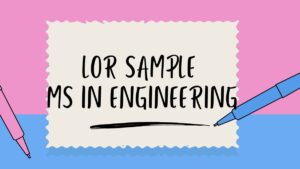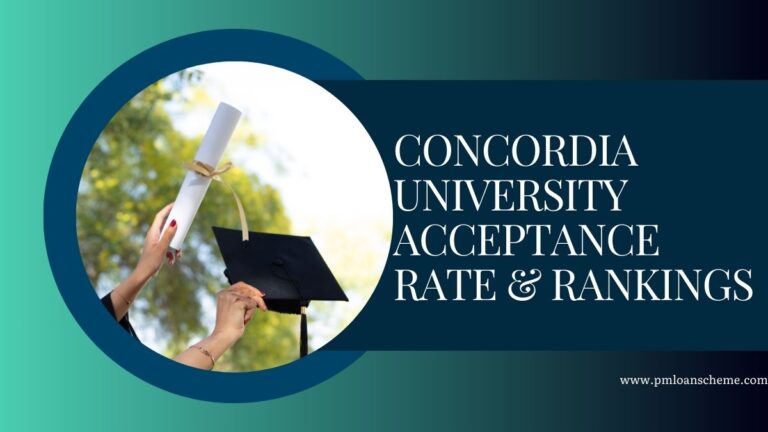Letter of Recommendation for Masters Program in Engineering
When applying for a master’s program in engineering, a strong letter of recommendation can be a significant asset, providing insight into a candidate’s academic, technical, and interpersonal strengths. A well-crafted recommendation not only strengthens the applicant’s profile but also highlights the skills and traits that align with the rigorous demands of a graduate program in engineering. In this guide, we’ll go over how to write a compelling, detailed, and impactful letter of recommendation for a master’s program in engineering.
LOR for Master in Engineering
A letter of recommendation should serve as a testament to the candidate’s capabilities, reliability, and potential for success in advanced studies. For graduate programs in engineering, admissions committees seek evidence of problem-solving skills, analytical abilities, teamwork, leadership, and dedication to innovation. This letter will ideally come from someone familiar with the applicant’s work ethic, academic achievements, and professional experience (if any).

Who Should Write the Recommendation?
A letter of recommendation for an engineering master’s program should ideally come from a professor, research advisor, or employer in the engineering field who has worked closely with the applicant. This individual should have direct knowledge of the applicant’s technical skills, research abilities, or real-world engineering projects. Choosing the right person is key to ensuring an authentic, in-depth perspective on the candidate’s potential.
LOR Sample for MS in Engineering
| Sample Letter of Recommendation for MS in Engineering [Your Name] [Your Position/Title] [Your Department/Company/Organization] [University/Company Name] [Contact Information: Phone and Email] [Date] Admissions Committee [University Name] [Department of Engineering/Specific Engineering Program] [University Address] Dear Admissions Committee, I am honored to write this letter of recommendation for [Applicant’s Full Name], who I have had the pleasure of working with as a [Professor/Research Advisor/Manager] in [Department or Subject] at [University/Company Name]. Over the course of [duration of relationship], I have observed [Applicant’s First Name] consistently excel both academically and practically in the field of engineering. I am confident that [he/she/they] will make a valuable addition to the [specific engineering program, e.g., Master’s Program in Electrical Engineering] at [University Name]. During [his/her/their] time in my [class/lab/project], [Applicant’s First Name] demonstrated exceptional proficiency in [relevant field, e.g., mechanical engineering, data analysis, or robotics], which set [him/her/them] apart from other students. [He/She/They] was instrumental in completing a project on [mention a specific project or research topic], where [he/she/they] displayed a remarkable ability to [mention specific skills, e.g., apply theoretical knowledge, solve complex problems, or develop innovative solutions]. This project required advanced technical knowledge, analytical skills, and creativity, all of which [Applicant’s First Name] executed with ease. One of the aspects that truly distinguishes [Applicant’s First Name] is [his/her/their] problem-solving skills. When faced with challenges in our recent project on [specific project topic], [he/she/they] devised a unique solution that not only addressed the issue effectively but also led to a [mention any specific outcome, e.g., “20% reduction in production costs” or “increased system efficiency”]. [Applicant’s First Name] approached this task with enthusiasm and determination, working tirelessly until the optimal solution was achieved. [He/She/They] has a natural ability to think outside the box, which will certainly be an asset in any rigorous graduate program. In addition to technical skills, [Applicant’s First Name] possesses excellent teamwork and leadership qualities. [He/She/They] worked closely with a diverse group of peers, guiding them through complex tasks, delegating responsibilities, and ensuring that each team member was fully engaged. [Applicant’s First Name]’s collaborative nature and strong communication skills were integral to the success of our projects, and [he/she/they] earned the respect and admiration of both [his/her/their] peers and supervisors. Beyond [his/her/their] academic and professional capabilities, [Applicant’s First Name] is genuinely committed to furthering [his/her/their] knowledge in engineering. [He/She/They] is eager to take on new challenges and continuously seeks opportunities to expand [his/her/their] skill set. [Applicant’s First Name] has expressed a deep interest in [specific engineering field or research interest relevant to the master’s program], and I believe that [he/she/they] will greatly benefit from the resources, mentorship, and advanced curriculum at [University Name]. In conclusion, I wholeheartedly recommend [Applicant’s Full Name] for admission to your Master’s Program in [specific engineering field]. I am confident that [his/her/their] technical expertise, problem-solving ability, and dedication to the field of engineering will make [him/her/them] an outstanding addition to your program. Please feel free to contact me at [Your Phone Number] or [Your Email Address] should you require any further information. Thank you for considering this recommendation. Sincerely, [Your Name] [Your Position/Title] [Your Department/Company/Organization] |
Sample Letter of Recommendation for MS in Engineering
Structuring the Letter of Recommendation
A well-organized letter of recommendation is typically one to two pages long and follows a clear structure: introduction, body paragraphs, and a conclusion.
- Introduction In the introductory paragraph, the recommender should state who they are, their relationship with the applicant, and the capacity in which they have worked with them. A brief introduction to their own background can lend credibility to the letter, especially if they have experience or credentials in engineering or academia. Example:
“I am pleased to recommend [Applicant’s Name] for the Master’s Program in [Specific Engineering Field] at [University Name]. As a [Professor/Supervisor/Manager] in [related department or company], I have had the opportunity to work closely with [Applicant’s Name] for [duration], during which I observed their exceptional technical skills, commitment to learning, and their remarkable aptitude for solving complex engineering problems.”
- Body Paragraphs The body of the letter should highlight the applicant’s strengths, skills, and achievements. Each paragraph can focus on different aspects of their qualifications. Here are some focal points to include:
- Technical Proficiency: Detail the candidate’s specific engineering skills and knowledge in areas like mechanics, electronics, software, or any specialization relevant to their master’s program. Mention any technical projects, experiments, or analyses the candidate excelled in.
- Problem-Solving Abilities: Emphasize instances where the applicant demonstrated creativity or innovation in addressing engineering challenges. Admissions committees look for students who can think critically and apply theoretical knowledge to practical situations.
- Teamwork and Collaboration: In engineering, teamwork is essential. Highlight how the candidate works in a team setting, either in group projects, lab collaborations, or during internships. This gives the admissions team a sense of the candidate’s interpersonal and communication skills.
- Work Ethic and Initiative: Admissions teams appreciate candidates who show dedication, discipline, and a willingness to go beyond requirements. If the applicant has taken initiative, led a project, or shown significant progress in an independent study, this is worth mentioning. Example:
“During our collaborative project on [specific project or research topic], [Applicant’s Name] displayed an exceptional grasp of [relevant technical skills]. Their ability to troubleshoot issues, coupled with a methodical approach to problem-solving, greatly contributed to the project’s success. Not only did they show competence in core engineering principles, but they also demonstrated a keen ability to innovate when faced with technical challenges, developing a solution that reduced operational costs by [mention any specific outcome, if applicable].”
- Conclusion Conclude the letter by summarizing the candidate’s key strengths and endorsing their suitability for the master’s program. Offer your willingness to provide further information if needed, and provide contact information. Example:
“In conclusion, I highly recommend [Applicant’s Name] for the Master’s Program in [Engineering Field] at [University Name]. Their technical acumen, problem-solving abilities, and dedication make them an ideal candidate for advanced study. I am confident that they will bring the same enthusiasm and skill to your program as they have shown in their work with me. Please feel free to contact me at [contact information] should you require any additional information.”
Tips for Writing an Effective Letter of Recommendation
- Be Specific: Avoid generic language. Instead, give concrete examples of the candidate’s achievements and skills. For instance, instead of saying “good problem-solver,” mention a specific project or task where they solved a challenging problem.
- Use Strong, Positive Language: Phrases like “exceptional analytical skills,” “demonstrated leadership,” or “eager to learn” create a strong impression. Use phrases that convey enthusiasm and confidence in the applicant’s abilities.
- Tailor to the Program: If possible, customize the letter based on the specific master’s program. Mention relevant coursework, labs, or facilities at the university that the candidate would benefit from and contribute to.
- Maintain a Professional Tone: A recommendation letter should sound professional yet personalized. Avoid overly casual language and keep the tone positive, respectful, and focused on the candidate’s strengths.
Writing a strong letter of recommendation for a master’s program in engineering requires a balanced blend of specific examples, tailored language, and an emphasis on both technical and interpersonal skills. By following these guidelines, recommenders can effectively support an applicant’s journey toward advanced studies, while ensuring that their endorsement stands out among the competition.
Letter of Recommendation (LOR) for a Master’s Program in Engineering
What is a letter of recommendation for a Master’s program in engineering?
A letter of recommendation for a Master’s program in engineering is a formal endorsement written by a professor, research advisor, or employer. It highlights the candidate’s academic abilities, technical skills, and potential for success in graduate-level engineering studies.
Who should write my letter of recommendation for an engineering masters program?
Ideally, your letter of recommendation should come from someone who knows your technical skills and academic achievements well. This could be a professor, research advisor, or employer who has supervised you in engineering-related work or projects.
What should be included in a recommendation letter for an engineering master’s program?
A strong recommendation letter should include the recommender’s relationship with the applicant, specific examples of the candidate’s engineering skills, problem-solving abilities, teamwork, leadership, and any notable achievements that demonstrate readiness for graduate studies in engineering.
How long should a letter of recommendation for a Master’s in engineering be?
The letter should typically be one to two pages long. It should be concise but detailed enough to cover key strengths, skills, and relevant experiences of the candidate.
Can a work supervisor write my letter of recommendation for graduate engineering programs?
Yes, a work supervisor is often an excellent choice, especially if they have firsthand knowledge of your engineering skills, project contributions, and work ethic. Make sure they can provide specific examples that relate to your potential success in an engineering master’s program.
What format should I use for my engineering letter of recommendation?
A typical recommendation letter format includes an introduction explaining the relationship with the candidate, body paragraphs with examples of relevant skills and achievements, and a conclusion summarizing the candidate’s strengths and suitability for the program.
How important is a letter of recommendation for an engineering master’s application?
A strong letter of recommendation is essential for a master’s application. It provides a personal endorsement of your skills and character, which can strengthen your application by offering the admissions committee insights beyond your grades and test scores.


